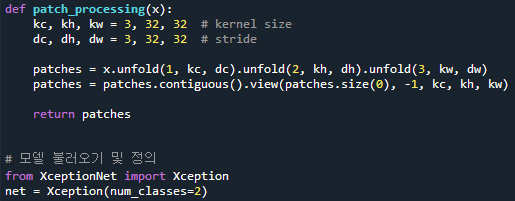Thank you for your answers. The Xception I use looks like this.
import torch
import torch.nn as nn
device = torch.device("cuda" if torch.cuda.is_available() else "cpu")
# Depthwise Separable Convolution
class SeparableConv(nn.Module):
def __init__(self, in_channels, out_channels):
super().__init__()
self.seperable = nn.Sequential(
nn.Conv2d(in_channels, in_channels, 3, stride=1, padding=1, bias=False),
nn.Conv2d(in_channels, out_channels, 1, stride=1, padding=0, bias=False)
)
def forward(self, x):
x = self.seperable(x)
return x
# EnrtyFlow
class EntryFlow(nn.Module):
def __init__(self):
super().__init__()
self.conv1 = nn.Sequential(
nn.Conv2d(3, 32, 3, stride=2, padding=1, bias=False),
nn.BatchNorm2d(32),
nn.ReLU(),
nn.Conv2d(32, 64, 3, stride=1, padding=0, bias=False),
nn.BatchNorm2d(64),
nn.ReLU()
)
self.conv2_residual = nn.Sequential(
SeparableConv(64, 128),
nn.BatchNorm2d(128),
nn.ReLU(),
SeparableConv(128, 128),
nn.BatchNorm2d(128),
nn.MaxPool2d(3, stride=2, padding=1)
)
self.conv2_shortcut = nn.Sequential(
nn.Conv2d(64, 128, 1, stride=2, padding=0),
nn.BatchNorm2d(128)
)
self.conv3_residual = nn.Sequential(
nn.ReLU(),
SeparableConv(128, 256),
nn.BatchNorm2d(256),
nn.ReLU(),
SeparableConv(256, 256),
nn.BatchNorm2d(256),
nn.MaxPool2d(3, stride=2, padding=1)
)
self.conv3_shortcut = nn.Sequential(
nn.Conv2d(128, 256, 1, stride=2, padding=0),
nn.BatchNorm2d(256)
)
self.conv4_residual = nn.Sequential(
nn.ReLU(),
SeparableConv(256, 728),
nn.BatchNorm2d(728),
nn.ReLU(),
SeparableConv(728, 728),
nn.BatchNorm2d(728),
nn.MaxPool2d(3, stride=2, padding=1)
)
self.conv4_shortcut = nn.Sequential(
nn.Conv2d(256, 728, 1, stride=2, padding=0),
nn.BatchNorm2d(728)
)
def forward(self, x):
x = self.conv1(x)
x = self.conv2_residual(x) + self.conv2_shortcut(x)
x = self.conv3_residual(x) + self.conv3_shortcut(x)
x = self.conv4_residual(x) + self.conv4_shortcut(x)
return x
# MiddleFlow
class MiddleFlow(nn.Module):
def __init__(self):
super().__init__()
self.conv_residual = nn.Sequential(
nn.ReLU(),
SeparableConv(728, 728),
nn.BatchNorm2d(728),
nn.ReLU(),
SeparableConv(728, 728),
nn.BatchNorm2d(728),
nn.ReLU(),
SeparableConv(728, 728),
nn.BatchNorm2d(728)
)
self.conv_shortcut = nn.Sequential()
def forward(self, x):
return self.conv_shortcut(x) + self.conv_residual(x)
# ExitFlow
class ExitFlow(nn.Module):
def __init__(self, num_classes=10):
super().__init__()
self.conv1_residual = nn.Sequential(
nn.ReLU(),
SeparableConv(728, 1024),
nn.BatchNorm2d(1024),
nn.ReLU(),
SeparableConv(1024, 1024),
nn.BatchNorm2d(1024),
nn.MaxPool2d(3, stride=2, padding=1)
)
self.conv1_shortcut = nn.Sequential(
nn.Conv2d(728, 1024, 1, stride=2, padding=0),
nn.BatchNorm2d(1024)
)
self.conv2 = nn.Sequential(
SeparableConv(1024, 1536),
nn.BatchNorm2d(1536),
nn.ReLU(),
SeparableConv(1536, 2048),
nn.BatchNorm2d(2048),
nn.ReLU()
)
self.avg_pool = nn.AdaptiveAvgPool2d((1,1))
def forward(self, x):
x = self.conv1_residual(x) + self.conv1_shortcut(x)
x = self.conv2(x)
x = self.avg_pool(x)
return x
# Xception
class Xception(nn.Module):
def __init__(self, num_classes=10, init_weights=True):
super().__init__()
self.init_weights = init_weights
self.entry = EntryFlow()
self.middle = self._make_middle_flow()
self.exit = ExitFlow()
self.linear = nn.Linear(2048, num_classes)
# weights initialization
if self.init_weights:
pass
def forward(self, x):
x = self.entry(x)
x = self.middle(x)
x = self.exit(x)
x = x.view(x.size(0), -1)
x = self.linear(x)
return x
def _make_middle_flow(self):
middle = nn.Sequential()
for i in range(8):
middle.add_module('middle_block_{}'.format(i), MiddleFlow())
return middle
def _initialize_weights(self):
for m in self.modules():
if isinstance(m, nn.Conv2d):
nn.init_kaiming_normal_(m.weight, mode='fan_out', nonlinearity='relu')
if m.bias is not None:
nn.init_constant_(m.bias, 0)
elif isinstance(m, nn.BatchNorm2d):
nn.init_constant_(m.weight, 1)
nn.init_bias_(m.bias, 0)
elif isinstance(m, nn.Linear):
nn.init_normal_(m.weight, 0, 0.01)
nn.init_constant_(m.bias, 0)
if __name__ == "__main__":
x = torch.randn([1,3,256,256])
x = x.to(device)
net = Xception(num_classes=2).to(device)
y = net(x)
The dataset used is 256×256 image of FFHQ. I would like to simply divide this 256x256 image into 16 chapters 32x32 to preprocess and learn. I don’t know if this will help, but I look forward to your kind cooperation again.

![]()

